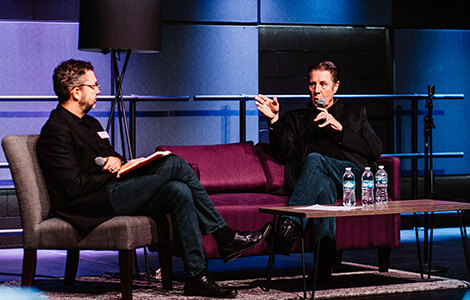Music City Colloquy event features expert on Music Modernization Act

Music City Colloquy event features expert on Music Modernization Act

Signed into law on Oct. 11, the Music Modernization Act (MMA) provides sweeping reforms to music copyright law. But deciphering exactly what the new legislation means for musicians, songwriters and labels can be a little confusing.
That’s why Trevecca’s School of Music and Worship Arts held a special Music City Colloquy event on Monday, Oct. 22, to help students and others better understand the legislation. John J. Thompson, associate dean of the School of Music and Worship Arts, moderated the conversation with Bart Herbison, executive director of the Nashville Songwriters Association International (NSAI).
“I think this is the most important tool we’ve had,” Herbison said about the act during the session. “It’s not going to fix everything overnight, but we’re finally going to have control of a significant part of the process.”
The School of Music and Worship Art’s Music City Colloquy series is now in its third year. The events feature musicians, songwriters and music industry experts who share about their life, work and experiences and help to give students a glimpse inside the industry.
During the evening session, Herbison and Thompson outlined the legislation’s main points, all of which revamp Section 115 of the U.S. Copyright Act in an attempt to bring copyright law up to speed for streaming. The act accomplishes three things:
- The Music Works Modernization Act streamlines the music-licensing process and creates a fairer process for setting royalties, making it easier for those with rights to the music or lyrics to be paid when their music is streamed.
- The Compensating Legacy Artists for their Songs, Service & Important Contributions (CLASSICS) Act extends federal copyright protection to sound recordings made before 1972.
- The Allocation for Music Producers (AMP) Act, which improves royalty payments to producers, engineers and mixers.
In an interview format, Herbison explained the difference between mechanical and performance rights, helped students to understand the history of the legislation in addition to giving industry advice ranging from highlighting performance-rights organizations to detailing areas of music law that will need to be considered in the future.
Herbison ended the night with a challenge to Trevecca’s music students.
“I think this is the most exciting time [to be a songwriter],” he said. “Don’t let anything I’ve said intimidate you; let it challenge you. Remember, it all begins with a song, so go write your songs.”
The NSAI is the world’s largest not-for-profit songwriters trade association. Established in 1967, the membership of more than 5,000 active and professional members spans the United States and foreign countries. NSAI is dedicated to protecting the rights of and serving aspiring and professional songwriters in all genres of music.
About Trevecca Nazarene University
Trevecca Nazarene University is a Christian university in the heart of Nashville focused on preparing students for lives of leadership and service. Founded in 1901, Trevecca is committed to holistic education, encouraging students to grow intellectually, socially, emotionally, physically and spiritually. U.S. News & World Report ranked Trevecca as a national university in the annual “2019 America’s Guide to Colleges,” making the University the only Nazarene institution to receive the national ranking. In 2016, the Carnegie Foundation classified Trevecca as a doctoral university, ranking it among the top 7 percent of schools nationwide. Located just one mile from thriving downtown Nashville, Trevecca offers classes at the main campus as well as four other locations across the Southeast and online classes offered worldwide. With students from 47 states and 25 countries, Trevecca offers 15 associate degrees, 83 undergraduate majors, 20 master’s programs, and two doctoral programs, as well as specialist and certificate programs.
Media contact: Mandy Crow, mmcrow@trevecca.edu, 615-248-1695
